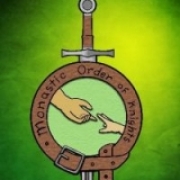- Posts: 1371
Philosophical Health Check
tzb wrote:
ren wrote: Atheism means "no faith in god". NOT "faith in no god".
It can be either. From the OED:
atheism
Line breaks: athe|ism
Pronunciation: /ˈeɪθɪɪz(ə)m /
NOUN
[MASS NOUN]
Disbelief or lack of belief in the existence of God or gods.
Or, from the eternally reliable Wikipedia:
Atheism is, in a broad sense, the rejection of belief in the existence of deities. In a narrower sense, atheism is specifically the position that there are no deities.
It's after the time at which my mind functions properly and I probably shouldn't post this...
But aren't these same tzb?
Master: Wescli Wardest
Clerical Mentor : Master Jestor
Rank: Apprentice
Clerical Rank: Licensed Minister
Please Log in to join the conversation.
1. Statements 1 and 27: Is morality relative?
I have my own definition of evil which supports this, and is not subjective.
2. Statements 5 and 29: Can you put a price on a human life?
Option seemed to be to vulnerable to waste or mismanagement, not direct enough to be a contradiction.
3.Statements 24 and 3: How much must I protect the environment?
The problem here is the word 'unnecessary'.
4. Statements 26 and 6: Can I make choices for my own body?
Contradiction is subjective, termination of the body exceeds parameters for survival and so I consider it a breach of rights. (typed in automoton voice).
5. Statements 22 and 15: What is the seat of the self?
I wonder how many Jedi get the tension for "What is the seat of the self?".. perhaps the seat transforms/changes rather then exists in one state or the other.
6. Statements 14 and 25: How do we judge art?
Tension yes, but not a contradiction.
7. Statements 16 and 21: What should be legal?
Personal experience, on at least two examples.
Please Log in to join the conversation.
tzb wrote:
ren wrote: Atheism means "no faith in god". NOT "faith in no god".
It can be either. From the OED:
atheism
Line breaks: athe|ism
Pronunciation: /ˈeɪθɪɪz(ə)m /
NOUN
[MASS NOUN]
Disbelief or lack of belief in the existence of God or gods.
Or, from the eternally reliable Wikipedia:
Atheism is, in a broad sense, the rejection of belief in the existence of deities. In a narrower sense, atheism is specifically the position that there are no deities.
Disbelief can mean refusal to accept the truth (in which case "god" must be true) or lack of belief. Which brings us back to "what proves what?" and "what's truth anyway?"
It must be noted that increasingly atheism is being represented only as one kind of atheism, with the others often finding themselves classed as agnostics. In countries like the US it means both the agnostic gets away with "covertly" being an atheist when in religious crowds, but to the church it also means they are more easily conquered .
Being atheist is literally having no god. Having no god can mean:
-having no faith in gods that do not exist.
-refusing to acknowledge the existence of a god that does exist.
For atheism to mean no faith in god, a god would first have to exist, but atheists don't believe that.... so atheists will self identify as "having no faith in the god that does not exist", whilst theists (people who believe in god) will define atheism as "refusing to acknowledge the existence of a god that does exist".
Convictions are more dangerous foes of truth than lies.
Please Log in to join the conversation.
- Wescli Wardest
-

- Offline
- Knight
-

- Unity in all Things
- Posts: 6458
So that, in turns, leads me to ask… can there be Atheist Jedi?
Please Log in to join the conversation.


